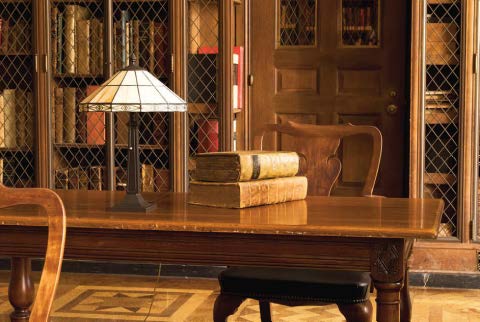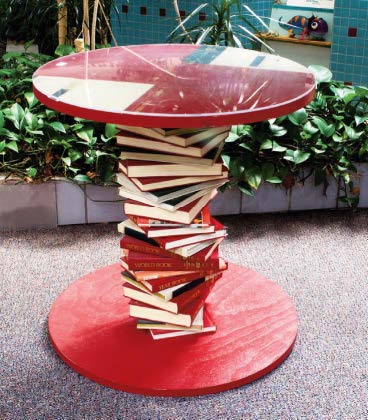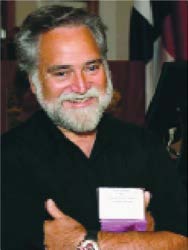ANCORA IMPARO
RICK RADER, MD ■ EDITOR-IN-CHIEF
Books By the Pound
Books By the Pound Exceptional Parents don't care if powerful people's books are found in PubMed, the National Medical Library or the Library of Congress… they want to partner with action-oriented people who will leave the books behind and fight to be at the front of the line alongside of them.
The weather in Chattanooga announced that spring was around the corner. It was Wednesday and the temperature was approaching 70, quite the turn from the near-freezing weather we had been exposed to for the past several months.
It wasn't more than 10 minutes of my enjoying seeing the sun from my office window that Susan, my trusted and mischievous administrative assistant comes into my office and announces, "Dr. Rader it's time for some Spring Cleaning." After over 20 years of our duet, I know when she has logic and reason on her side.
My only thought about cleaning echoed that of the comedian Phyllis Diller, "Cleaning can't kill you but why take a chance."
I'm a seasoned accumulator, but parting with things comes hard especially when it relates to my professional stash. Books, journals, monographs, papers, letters and bound reports remind me of my journey to wherever it is I am today. But the reality is I never refer back to my medical books. Everything you need (and don't need) can be found on the internet. Still, there was something about seeing them on the bookshelf; they reminded me of veteran soldiers standing at attention during a ceremony to honor their service.
"Let's start with the books that are in the closed cabinets," she offered as an opening suggestion. "You can't see them, you don't use them, you couldn't even tell me what's in there; they might as well not be there." Despite the fact that as a scientist who cherishes and relies on logic and reason, I hate when it's used against me.


PENNYWISE: I had vivid memories of being star-stuck at the volumes of leather-bound medical books neatly arranged on Dr. Mensch's bookshelves. It was a simple equation; books equaled knowledge. Books By The Pound pretty much tells you what they're all about. They sell books for two dollars a pound.
I immediately responded, "Well we just can't throw them in the dumpster," as if I had just investigated all the ways that old medical books could be repurposed. I told her to find out what the best practices were regarding "used" medical books. I refused to refer to them as "old" medical books; since they were new when I bought them, so that would confirm that I was "old."
Years ago, there was a welcome path for retiring "old" medical books. There were global medical education organizations that would ship the books to developing countries that did not have access to medical books. They were provided to hospitals, clinics, medical schools, and they were put to use by appreciative physicians who did not have access to receiving current and ever changing medical information. The internet has allowed physicians from all over the world to immediately access the newest medical practices at the same time that their counterparts at Mass General can retrieve them.
I still had vivid memories of going to see our trusted family physician (then known as G.P.s) Dr. Mensch. I was star-stuck at the volumes of leather-bound medical books neatly arranged on his bookshelves. Those books were the perfect subliminal suggestion that Max Mensch, M.D. was the best doctor around. He had to be, since he knew everything that was in those books. The fact that some of the books were in German also raised the bar as well as the eyebrows of his patients. It was a simple equation; books equaled knowledge, and the assumption was Dr. Mensch had both.
Medical books have not been the only victims of electronic knowledge spread. Law books have also taken a back seat to the keyboard. Lawyers had yards and yards of law books in their office; they were the tools of their trade. Law books are now sold by the yard. Young lawyers buy them to decorate their offices and to give the same aura of expertise that worked for Dr. Mensch. In fact, there are companies that sell law books by the linear foot. If space is a consideration, you can just buy the bound spines of the book, saving about eight inches of shelf space. They still give the appearance of a fully stocked law library.
It's sad to see our oldest friends, "our books" being used for land fill, display, and door stops. According to Google's advanced algorithm (which is not found in any actual book) there have been 129,864,880 books published in all of modern history. That's a lot of shelf space. Luckily, not everyone was inclined to dump the volumes when the pages were either well-thumbed or became yellowed.
The oldest book in the world is The Instruction of Ptah-Hotep, an Egyptian guide to teaching ethics and codes of conduct for boys and young men on how to best behave in the society of that time. It's attributed to a Vizier of King Djedkare-Isesi (2414-2375 BCE) named Ptah-Hotep who believed that keeping the social order as-is was the right thing to do. I imagine it looked impressive on the shelf of Egyptian politicians. As an aside, you can get the link to the book from the Pyramid Scrolls newsletter so you don't have to give up any shelf space.

BOOK A TABLE: Dr. Rader's repurposed "old" books table created by Dennis Wilkes of the Orange Grove Center.
Mona Thomas shares that "Books By The Pound" in Lawrenceville, Georgia "pretty much tells you what they're all about. This massive 20,000 square foot building has a stock of over 70,000 used books that all need new loving homes." They sell all the books for two dollars a pound.
We know that Exceptional Parents all over the world have not always been impressed with powerful people sitting at a desk with shelves of impressive books behind them. While they understand that many books have been written about the theories and practices of understanding – treating and supporting children with special health care needs they know – they also know that it takes more than "books" to provide opportunities for their children. In fact, they don't care if the books are found in PubMed, the National Medical Library or the Library of Congress… they want to partner with action-oriented people who, at a moment's notice, will leave the books behind and fight to be at the front of the line alongside of them.
Susan convinces me to bring my "used" medical books to a local business that buys and sells books, records, CDs, games and virtually everything that can fit on a shelf. I bring them 42 medical books and they instruct me to return in half an hour for their "buying" decision. I am informed that they will purchase two of the books. They share with me that I have two options. I can receive an "instore" credit or cash. They further provide that the "in-store" credit is $2.64 or the cash is $1.78. I go for the cash. I estimate that the cost of gas to drive to and from the store was about $2.00. Susan has her mind made up on what we will do with the remaining 63 "old" medical books.
It dawned on me that this was a novel "take home" message. Some things have their time. They make their contributions and, at best, they may result in good, and then are put to rest. I imagine that will be the course of my own life. The only possible saving grace would be if they pay my wife two dollars a pound.•
ANCORA IMPARO

In his 87th year, the artist Michelangelo (1475 -1564) is believed to have said "Ancora imparo" (I am still learning). Hence, the name for my monthly observations and comments. – Rick Rader, MD, Editor-in-Chief, EP Magazine Director, Morton J. Kent Habilitation Center Orange Grove Center, Chattanooga, TN